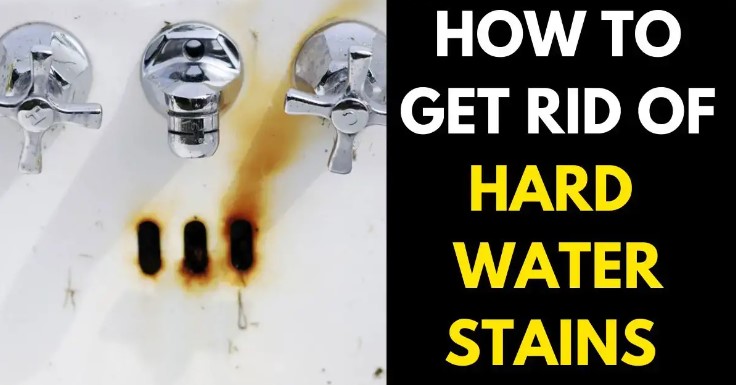Hard water may be the cause of any foggy or white stains on your glasses or in the shower, even if you take good care of your cleaning. Those ugly stains are left behind by the minerals in hard water that remain after the water evaporates. Not only are these stains unsightly, but they have the potential to eventually obstruct drains. By knowing how to effectively remove hard water stains, you can ensure that your showers and faucets stay clear while also saving time by preventing the accumulation of these chalky streaks.
What is hard water exactly, and why does it happen?
A high mineral content, such as that of calcium, iron, or magnesium, is what defines hard water. When the water dries, these minerals are what cause the stains that are so difficult to remove. These marks are usually white, but depending on the particular minerals in your water, they can sometimes turn brown or rusty.
Vinegar
Vinegar is a multipurpose, all-natural cleanser that works wonders on stains from hard water and is safe to use around the house.
Just fill a spray bottle with vinegar, then lightly mist any surface that has those tough stains on it. Let it remain for five to fifteen minutes so the vinegar has time to dissolve the minerals causing the white, chalky streaks.
Reapply the vinegar to maintain moisture on the surface if it begins to dry out. To keep the surface wet for the required amount of time, you can apply paper towels that have been soaked in vinegar to big vertical sections, such as shower doors.
After the vinegar has soaked for a sufficient amount of time, clean the surface with an old toothbrush. Use a brush with larger bristles for broader areas.
For this task, you can use any kind of vinegar—apple cider vinegar or white vinegar, for example. With whatever you have available, start first. If that isn’t good enough, try cleaning vinegar, which is more acidic and can remove stains from hard water more effectively.
Hydrogen Peroxide with Tartar Cream
For removing stubborn soap scum and water stains from bathtubs and metal fixtures, regular hydrogen peroxide works wonders. Make a paste with cream of tartar, a kind of baking powder, and apply it to the soiled area for more cleaning power.
After letting it sit for up to half an hour, give it a quick scrub with a wet sponge to see the amazing benefits of your work.
Making Soda
Although removing stains from hard water on ceramic tile might be difficult, baking soda is an effective solution. Combine baking soda and water to make a paste, then apply it to the impacted areas. Let this all-natural cleanser do its magic for a couple of minutes.
After that, use a toothbrush or another brush with bristles to gently scrub the tiles until they appear brand new.
toothpaste with fluoride
Fluoride toothpaste is probably used for dental hygiene, but it also works well for removing stains left behind by hard water. This essential bathroom product is great for use on glass surfaces, tiny metal fixtures, and even dishes!
Installing a water softener could be a good idea if you’re sick of dealing with hard water stains in general. By removing minerals from the water before it enters your pipes, this system helps to maintain the aesthetics of your plumbing fixtures and avoid stains from hard water.
Additionally, a water softener helps you prevent common problems caused by hard water, like clogged faucets, reduced showerhead effectiveness, issues with water heaters, dingy-looking clothing, dead hair, and irritated skin.
Borax
Cleaning expert Lucy Henderson says borax works well for eliminating stains from hard water, even though it’s usually used for laundry.
For this use, combine borax and white vinegar and stir until a thick, spreadable paste develops. Using an old toothbrush, apply the paste to the stain, then leave it on for 20 to 30 minutes.
Henderson says that this technique works especially well for toilets. Simply flush the system once or twice to remove the spots and leave your surfaces clean and stain-free after letting the paste do its job.

